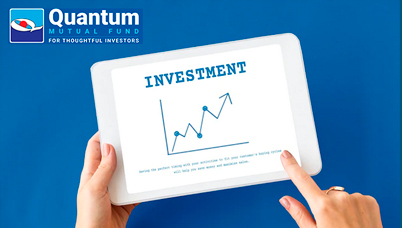Know The Expense Ratio Of Your Mutual Fund
Posted On Monday, Jan 09, 2017
You often hear that expense ratio of a fund is 2.5% or 2%, but in all that fine print, it tends to get lost somewhere and we, as investors, tend to underestimate the impact of this ratio on your mutual fund portfolio. Let’s discuss this topic today in detail, which could actually be a very important factor in selecting a fund.
What is Expense Ratio?
The expense ratio is a measure of what it costs an investment company to operate a mutual fund. This is expressed as a ratio of your overall investment with the fund. The largest component of the expense ratio is the fee paid to a fund's investment managers. The fees of the fund managers/advisors vary from fund to fund.
You may have heard your colleague or your boss, waving a finger at you and saying "There is no such thing as a free lunch". As customers you pay fee or charges for all services, you enjoy. Similarly, mutual funds too charge a fee for managing your money. For example, if you invest Rs 10,000 in a fund with an expense ratio of 1.5 percent, then you are paying the fund Rs 150 to manage your money.
This expense ratio tends to differ from fund house to fund house and even from scheme to scheme! Don't forget, the expense ratio is a fixed component whether a fund generates positive/negative returns you have to pay fees. Thus before investing in a fund you must know the expense ratio of that fund.
So all funds with lower expense ratios are great right? The fund philosophy also matters, a fund house focused on costs may lower expense ratio on matter of principle, a fund house wanting more AuM may drop expense ratios for a completely different reason. A low expense ratio does not mean a fund is better managed or vice versa. A good fund should have a combination of healthy returns across market cycles with minimal expenses.
Though the expense ratio is a very important factor in the selection of a fund; there are other factors like fund house pedigree, long-term track record and portfolio quality which hold vital importance in the process of fund selection. Only after ticking all these check boxes do we need to look at the expense ratio. Ideally as assets grow in a fund, expenses for the fund house tend to remain in a level plane. For example, for a factory to make more soap, more machines are need, but for a fund house, expense ratio tends not grow in line with AUM.
Where are details of the expense ratio mentioned?
You can find details for expense ratio in the offer document section or in a monthly fact sheet. The Key information Memorandum also has details for the recurring scheme expense.
Remember the old adage "Drops of water that makes an ocean", hence choose a fund which has a strong customer oriented philosophy....and a low expense ratio. A small difference in expense ratio matters a lot in selection of a fund, as that tiny amount, compounding over time can make a big difference.
Disclaimer, Statutory Details & Risk Factors:
The views expressed here in this article are for general information and reading purpose only and do not constitute any guidelines and recommendations on any course of action to be followed by the reader. Quantum AMC / Quantum Mutual Fund is not guaranteeing / offering / communicating any indicative yield on investments made in the scheme(s). The views are not meant to serve as a professional guide / investment advice / intended to be an offer or solicitation for the purchase or sale of any financial product or instrument or mutual fund units for the reader. The article has been prepared on the basis of publicly available information, internally developed data and other sources believed to be reliable. Whilst no action has been solicited based upon the information provided herein, due care has been taken to ensure that the facts are accurate and views given are fair and reasonable as on date. Readers of this article should rely on information/data arising out of their own investigations and advised to seek independent professional advice and arrive at an informed decision before making any investments.
Mutual fund investments are subject to market risks read all scheme related documents carefully.
Please visit – www.QuantumMF.com to read scheme specific risk factors. Investors in the Scheme(s) are not being offered a guaranteed or assured rate of return and there can be no assurance that the schemes objective will be achieved and the NAV of the scheme(s) may go up and down depending upon the factors and forces affecting securities market. Investment in mutual fund units involves investment risk such as trading volumes, settlement risk, liquidity risk, default risk including possible loss of capital. Past performance of the sponsor / AMC / Mutual Fund does not indicate the future performance of the Scheme(s). Statutory Details: Quantum Mutual Fund (the Fund) has been constituted as a Trust under the Indian Trusts Act, 1882. Sponsor: Quantum Advisors Private Limited. (liability of Sponsor limited to Rs. 1,00,000/-) Trustee: Quantum Trustee Company Private Limited. Investment Manager: Quantum Asset Management Company Private Limited. The Sponsor, Trustee and Investment Manager are incorporated under the Companies Act, 1956.
Related Posts
-

Invest without Stress - With Quantum Mutual Fund!
Posted On Monday, May 09, 2022
Since inception, Quantum AMC has stayed true to its Vision and Mission.
Read More -

Active or Passive Investing: Which Style is Right for You?
Posted On Tuesday, Apr 26, 2022
With such a wide variety of investment avenues and styles, you may be confused as to which is the best for you.
Read More -

Stay Ahead of Inflation During These Uncertain Times
Posted On Wednesday, Apr 13, 2022
Inflation has been slowly but steadily eating into the savings of investors.
Read More



